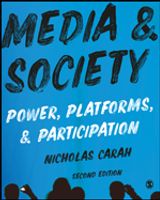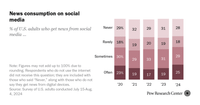Explore web search results related to this domain and discover relevant information.

How do we understand the impact of algorithms? How are media audiences produced and managed? Media & Society introduces the role of the media in social, cultural, political and economic life, unpacking the increasing entanglement of digital media technology with our everyday lives.
As our lives become ever more entangled with media of all kinds, and as digital media platforms grow in power, it is more important than ever to understand the fundamental role of media forms, technologies, and industries in society at large, as well as in the most intimate settings of everyday life.Media & Society expertly introduces all the key concepts and ideas you need to know, and then puts theory into practice by tying them to contemporary case studies.Associate Professor Nicholas Carah shows how a critical approach to power helps us not only to understand the role media play in shaping the social, but also how we can become critically informed media citizens ourselves, able to participate and be heard in meaningful ways.From using Ghostery to track how your personal data is being collected, to exploring misinformation on social media via Youtube, to the reality of internships and freelancing in today’s digital media industry. It is essential reading for students of media, communication and cultural studies.
The guide, launched in Addis Ababa by Norway’s Ambassador to Ethiopia Stian Christensen, draws from last year’s discussions between the two sectors on how to be...
The IGAD Centre of Excellence for Preventing and Countering Violent Extremism (ICEPCVE) on Tuesday unveiled a guide outlining best practices for collaboration between the media and civil society in advancing inclusive approaches to preventing violent extremism.The Ambassador of Norway to Ethiopia, Stian Christensen (far right) and Dr Simon Nyambura, the Director, IGAD's Centre for Preventing and Countering Violent Extremism, unveiled the first media–Civil Society Organisations' guide to advancing inclusive approaches to preventing violent extremism in the region.Kenya adopts new media code, ushering in stricter AI and child protection rules · Coast civil society groups demand inclusive dialogue to calm unrest"We have been building this network, and now we are happy to say we have a critical network of youth, media, and civil society that we have been able to connect within a digital hub," he said, urging them to boldly call out societal ills fuelling violent extremism.

Winner of the 2022 Textbook & Academic Authors Association′s The McGuffey Longevity Award Media/Society: Technology, Industries, Content, and Users helps students understand the relationship between media and society and gets them to think critically about recent media developments.
active actors advertising African Americans American argued Asian audiences Black broadcast cable campaign Chapter characters Comcast commercial communication conglomerates corporate coverage create critics cultural debates developed Disney diversity dominant Donald Trump economic example Facebook Fairness Doctrine film focus global media Google groups Hollywood ideology influence interaction interest interpret issues journalism journalists major mass media media companies media content media industry media influence media products media technology media users messages million net neutrality NHe is the author of Politics and the Class Divide: Working People and the Middle-Class Left. William Hoynes is dean of the faculty and professor of sociology at Vassar College in Poughkeepsie, New York. He teaches courses on media, culture, and social theory, and is former director of Vassar’s Media Studies program.He is the author of Public Television for Sale: Media, the Market, and the Public Sphere. Clayton Childress is an associate professor in the Department of Sociology at University of British Columbia.


The Lyceum Society examines the risks, rewards, and deeper consequences of modern internet communication.
Lyceum Society: Media and De-Civilization · Register for Access · 08 Sep 2025 · Events · Lyceum Society: Media and De-Civilization · Event Calendar · Presented by the Lyceum Society · To attend, click the “Register for Access” button at the time of the presentation.While internet communications have brought us immense benefits in convenience, power, and access, there are accompanying threats to what we might consider civilized life. This Lyceum Society presentation and discussion is meant to review a few of these threats and their possible consequences.Today Bill is active as an architectural walking tour guide (Grand Central Terminal and the NoHo Historic District) and is a founding member of Reform Elections Now, promoting vital improvements in the election processes such as ranked choice voting. He has spoken to the Lyceum Society on various topics and has chaired our discussions of timely issues.The Lyceum Society is a collegial venue promoting fellowship, education, and discussion among retired members of The New York Academy of Sciences.
Yogi Adityanath urges youth to avoid divisive online groups, stressing responsible use of technology for public welfare.
The UP chief minister said that it was the responsibility of the users to ensure that technology was adapted according to the needs of the society. Sanjay Pandey · Last Updated : 09 September 2025, 11:12 IST · ADVERTISEMENT · Follow Us : Comments · ADVERTISEMENT · Published 09 September 2025, 11:12 IST · India NewsBJPIndia PoliticsSocial media Uttar Pradesh

Media/Society: Technology, Industries, Content, and Users provides a framework to help students understand the relationship between media and socie...
Media/Society: Technology, Industries, Content, and Users provides a framework to help students understand the relationship between media and society while developing skills to critically evaluate both conventional wisdom and one’s own assumptions about the social role of media.The Eighth Edition retains its basic sociological framework but has been thoughtfully streamlined in length, while still including additional discussions of new studies and up-to-date material about a rapidly changing media landscape.Updated examples and new topics include generative AI in newsrooms, understanding how perceptions of authenticity in media industries are used to promote and sell media, and examining how tastes for media reflect and are sometimes used by audiences to create inequalities.A "big picture" sociological focus examines overarching relationships between the various components of the media process (the industry, its products, audiences, technology, the social world) to help students develop a broad understanding.


New Media & Society engages in critical discussions of the key issues arising from the scale and speed of new media development, drawing on a wide range of disciplinary perspectives and on both theoretical and empirical research.
Does anyone here have the pdf version of “Media/society : technology, industries, content, and users” 7th edition by David Croteau, and would send it…
Does anyone here have the pdf version of “Media/society : technology, industries, content, and users” 7th edition by David Croteau, and would send it to me?[Request] Technology and Society: Social Networks, Power, and Inequality (3rd Edition) by Anabel Quan-HaaseMedia Studies is an academic discipline that examines the the genealogy, histories, politics and effects of media.Posted by u/heilhaglet - 2 votes and 25 comments


The Special Issue on Platforms, publics, and anti-publics focused on the complex intersection of platforms, including issues around their ownership, dataficatio...
The conference also acts as horizon scan for key debates, emergent tensions, and new methodologies for social media research and scholarship. For over a decade, SMSociety has convened an interdisciplinary and international community, spanning the social sciences, arts and humanities, alongside computational and data sciences to interrogate the shifting entanglements of social technologies, culture, and society.In the last decades of social media – and centuries of sociological research, many have grappled with what, where, and how technologies impact publics, including who those publics include or exclude. In terms of conceptual models for a broad amalgamation of digital sites and services, we have moved from ‘network society’ – and the social organisation around flows and interconnected nodes to ‘platform society’ points to ‘the inextricable relation between online platforms and societal structures’ (Castells, 1996, 2023, Van Dijck et al., 2018, p.Alloing C., Fortant E., Pierre J., Richert F., Palisser R. (2025). Knowing Your Users by Heart: A Critical Examination of the Scientific Research on Emotions Conducted by Social Media Platforms. Social Media + Society, 11(3).Journal of Computer-Mediated Communication, 13(1), 210–230. https://doi.org/10.1111/j.1083-6101.2007.00393.x ... Browne S. (2015). Dark matters: On the surveillance of Blackness. Duke University Press. ... Bucher T. (2016). The algorithmic imaginary: Exploring the ordinary affects of Facebook algorithms. Information, Communication & Society, 20(1), 30–44.

The current state of online politics ... into society creating information imbalances. The EU’s Digital Services Act (DSA) compels platforms to open up their data to vetted researchers, conduct systematic risk assessments, and be held accountable for harmful content.[2] Moreover, the rise of general-purpose AI (text, image, video, voice) is turning every political actor into a media production ...
The current state of online politics is shaped by business models, that prioritize engagement, while externalizing risks such as election interference and disinformation into society creating information imbalances. The EU’s Digital Services Act (DSA) compels platforms to open up their data to vetted researchers, conduct systematic risk assessments, and be held accountable for harmful content.[2] Moreover, the rise of general-purpose AI (text, image, video, voice) is turning every political actor into a media production and psychological operations studio.Therefore, social media can either enhance democratic participation or worsen societal problems. Its role is a reflection of the strength of the institutions and rules that govern it. In the years ahead, platforms will function as both a battleground and governance tools, accelerating political cycles, reshaping citizen-state relations, and enabling hybrid forms of influence.The presence and centrality of social media have radically altered how citizens consume information, engage with politics, and even conceptualize democracy itself. The central challenge for democracies is to reconcile their potential with their corrosive effects. Societies should develop the institutional resilience, regulatory frameworks, and civic cultural needs to channel its strength toward a democratic end.To achieve this balance, civil society and independent organizations should be incorporated into governance structures, creating pluralistic oversight that prevents both state and corporate monopolization of information flows. The goal is not to suppress social media’s disruptive potential, but to channel in into a democratic infrastructure that strengthens trust, fosters deliberation, and protects citizens and institutions from manipulation without undermining their freedoms.

Rep. Jimmy Patronis, R-Fla., discusses the role of social media in the Minneapolis school shooting, a lawsuit against OpenAI by the parents of a teen who committed suicide and a watchdog warning of a meteorologist shortage.
The conference’s three-day program will feature panels and paper presentations, workshops, tutorials, networking events, and a poster session.
#SMSociety is a biennial gathering of leading social media researchers from around the world. It is the premier venue for sharing and discovering new peer-reviewed interdisciplinary research on how social media affects society.Aesthetics, Mediation, Politics.

Social media plays a crucial role in Americans' news consumption, with about one-third of adults saying they regularly get news on Facebook and YouTube.
Some social media sites – despite having relatively small overall audiences – stand out as destinations for news among many of their users. For example, 59% of X users get news there, as do a similar share of users on Truth Social (57%), the site owned by former President Donald Trump.There also are partisan differences among those who regularly get news on some social media sites. Overwhelming shares of regular news consumers on Truth Social (88%) and Rumble (83%) are Republicans or Republican-leaning independents, as are half of those on Facebook and YouTube.Digital sources have become an important part of Americans’ news diets – with social media playing a crucial role, particularly for younger adults. Overall, just over half of U.S.Facebook and YouTube outpace all other social media sites as places where Americans regularly get news. About a third of U.S.
Media/Society: Technology, Industries, Content, and Users: 9781506315331: Communication Books @ Amazon.com
Providing a framework for understanding the relationship between media and society, this updated Sixth Edition of Media/Society helps you develop the skills you need to critically evaluate both conventional wisdom and your own assumptions about the social role of the media.Now featuring streamlined content and a more engaging narrative, this edition offers expanded discussions of the "new media" world, including digitization, the internet, the spread of mobile media devices, the role of user-generated content, the potential social impact of new media on society, and new media’s effect on traditional media outlets"The best text to help students understand the often-complicated, ever-changing relationship between media and society." -- Seong-Jae Min"Media/Society gives students a comprehensive picture of the present-day media, media-related issues, and the future.

German media is rejoicing over Britain's migrant crisis after the number of Channel crossings this year topped 30,000 in record time, with one newspaper accusing the UK of loosing control of its borders despite Brexit. The popular Bild outlet claimed both civil society and infrastructure were ...
German media is rejoicing over Britain's migrant crisis after the number of Channel crossings this year topped 30,000 in record time, with one newspaper accusing the UK of loosing control of its borders despite Brexit. The popular Bild outlet claimed both civil society and infrastructure were 'groaning' under the weight of illegal and legal migration, warning that neither the NHS nor the housing market can keep pace with the 'sudden population explosion'.Debutantes revealed: Glamorous invitees to high-society event of the year including athletes and pageant queensPublished by Associated Newspapers Ltd DMG Media Contact us How to complain Leadership Team Advertise with us Contributors Work with Us Terms Do not sell or share my personal information CA Privacy Notice About Daily Mail Privacy policy & cookiesEXCLUSIVE Unspoken MAGA social media policy of Donald Trump's glamorous leading ladies revealed
Since its inception in 1979, Media, Culture & Society has published some of the finest theoretical and historical work in communication and cultural studies to emerge from Britain and continental Europe.
The journal has pioneered a unique and refreshing approach to the analysis of the media, offering a stimulating alternative to both the traditional empirical "effects" school and Althuserrian Marxism. Grouped in three parts, the articles in this critical reader represent a cross section of the best work published in Media, Culture & Society.This book will prove to be an invaluable guide to the influential tradition of media studies and a welcome asset both to teachers and students of communication and sociology-of-culture courses. "This valuable book is an anthology of sixteen articles published in the journal Media, Culture, & Society between 1975-1985.Broadband Black Death Cuts Queues. The Information Society and the UKA Critical Reader

The report recommends more awareness ... social media experiences may affect mental health and wellbeing, and monitoring of research into adaptive artificial intelligence (AI) generated algorithms. Professor Sir Ian Greer, president and vice-chancellor of Queen’s, said: “This important research highlights the crucial role Queen’s researchers play in addressing some of the most pressing issues facing society ...
The report recommends more awareness raising and education in school and at home, the need for more research and greater recognition of how social media experiences may affect mental health and wellbeing, and monitoring of research into adaptive artificial intelligence (AI) generated algorithms. Professor Sir Ian Greer, president and vice-chancellor of Queen’s, said: “This important research highlights the crucial role Queen’s researchers play in addressing some of the most pressing issues facing society today.More than half of 16-year-olds in Northern Ireland have experienced illegal or harmful behaviours on social media, research found.Social media stock.More than half of 16-year-olds in Northern Ireland have experienced illegal or harmful behaviours on social media, new research has suggested.
Media, Society, Culture, and You is an approachable introductory Mass Communication text that covers major mass communication terms and concepts including "digital culture." It discusses various media platforms and how they are evolving as Information and Communication Technologies change.
The book covers key areas of media history and culture/society, but feels quite limited in places. The glossary, and the approach to the book, feels quite basic. Very little in the way of theory is presented or explored. I would like to see key...The language is very accessible, which might make it a good text to utilize in a high school as well as an introductory course on media and society Anytime you are trying to condense complex histories there will always be portions that will be left out or lack detail.This text's title implies an ambitious goal: to discuss the convergence of media, culture, society, and the individual. Yet through some brisk chapters covering an array of forms including social media, the impact of technology and digitization on...Through a (brief) discussion of media history and development in each chapter, this book offers suggestions on WHY and HOW contemporary media has evolved to its current form, how the forces of culture and society have acted to shape media and vice-versa, and would allow space for student inquiry about where those forms might go from here with a good foundational awareness.

You may be a seasoned professional, a recent graduate starting out in the media, or someone just interested in the media. Whatever your background or role, there's a place for you in the Society.
Whether you're joining us in person or virtually, you'll be part of a community that is passionate about the media. From award-winning journalists to innovative content creators, from PR experts to media academics and students – our diverse network spans the British media landscape.

Javascript is disabled on your browser. To view this site, you must enable JavaScript or upgrade to a JavaScript-capable browser




